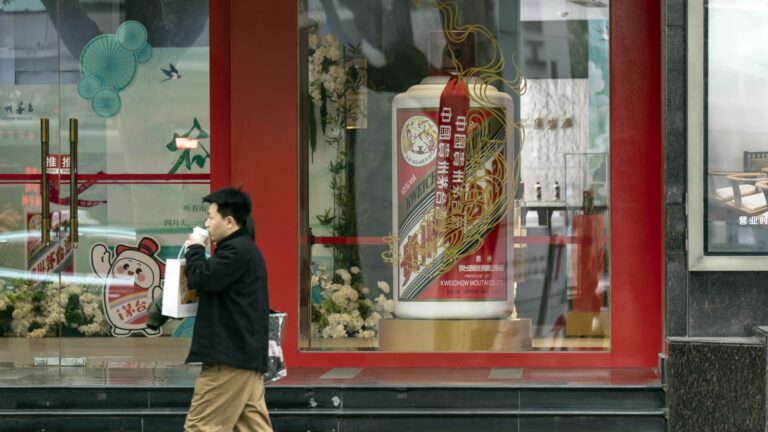Prices of China’s best-known alcohol brands are falling, stoking concerns about economic growth. The wholesale price of Kweichow Moutai’s 53-degree alcohol “Feixian” liquor, listed on the Shanghai Stock Exchange, has fallen more than 5% in a week. These prices are down more than 30% from their peak in September 2021, and Feixian’s wholesale price soared nearly 360% during the 2015-2021 housing boom, analysts at Nomura wrote in a research note. Also known as “Feitian Moutai,” this traditional Chinese baijiu is made from red yeast rice and is a status symbol used in government gifts and seen at business meetings and weddings for high-ranking officials. Old bottles also have collector value. It’s less clear whether the decline in an apparent proxy for China’s wealth means the company itself will take a big hit. High profit margins Jennifer Song, a senior equity analyst at Morningstar, said Kweichow Moutai maintains high profit margins and has “ample room” to raise its ex-factory price. Song said his recent discussions with institutional investors had not changed his view on Moutai. Although Kweichow Moutai has fallen 13% so far this year, it remains the largest stock by market capitalization on the Shanghai Composite Index and accounts for the majority of exchange-traded funds tracking mainland Chinese stocks. In contrast, PetroChina, the second-largest stock by market capitalization on the Shanghai Composite Index, has risen more than 40% since the start of the year. Ye Yuhua, manager of Guangzhou-based Liangdian Private Investment, said stock market leaders change every few years, and companies in upstream sectors such as copper, coal and crude oil have been doing well recently. He agreed that the drop in wholesale prices would not have a significant impact on Moutai’s immediate earnings. But he said it would have an impact on investor sentiment about the future. If an overstock occurs and starts to sell off within the next six to 12 months, Moutai will have to reduce its supply to the market. Anecdotes about the economy have not helped to raise expectations for demand for premium baijiu. Nomura analysts noted that existing home prices in China’s 50 major cities fell 26.5% from their peak in July 2021 through May 2024, according to industry data. Duty-free sales on the tropical Chinese island of Hainan fell in May and were down about 30% year-on-year in the first five months of 2024, according to local customs data. What’s different about Moutai’s share price drop is that investors aren’t rushing to the bottom as they have in the past, Ye said. Ye holds some Moutai shares and believes the price drop will create some opportunities. He, of course, doesn’t expect Moutai’s social status to change. Moutai Bank appointed a new chairman in late April after his predecessor took a position in the local government. At last month’s shareholders meeting, “the new chairman…emphasized respecting the profit model of distributors, while urging distributors to improve the company’s reputation and achieve mutual growth,” Huatai Financial Holdings said in a June 11 report. Huatai reiterated its buy recommendation, saying it is “optimistic about the company’s potential, supported by its strong brand and efficient operations.” It has a price target of 2,214.30 yuan ($304.97) on the stock. After Moutai released its first-quarter report in late April, Goldman Sachs, JPMorgan and Macquarie all set price targets of more than 2,000 yuan on the stock, according to FactSet. That’s more than 35% higher than Friday’s closing price. “We believe the recent decline in wholesale prices was mainly driven by market arbitrageurs,” said Morningstar’s Song. Song expects wholesale prices to rise in the coming months due to China’s major holidays in the fall. Second-quarter Weakness The second quarter is usually the weakest period for baijiu demand, but promotional activities around June 18 and Moutai’s own efforts to reach young people helped lower the final retail price, Song said. Song also noted that demand for weddings is falling as many people who adhere to traditional Chinese customs believe this year is not a good one to get married. Official Chinese data last week showed that the number of wedding registrations in the first quarter fell 8.3 percent from a year earlier to 1.97 million couples, the lowest since the pandemic began in 2020, according to Wind Information. Song said he was not changing his earnings forecast for the “moderately undervalued” stock, and said shares would need to fall to 1,262 yuan for Moutai to be “significantly undervalued.” Shares closed at 1,471 yuan on Friday.

